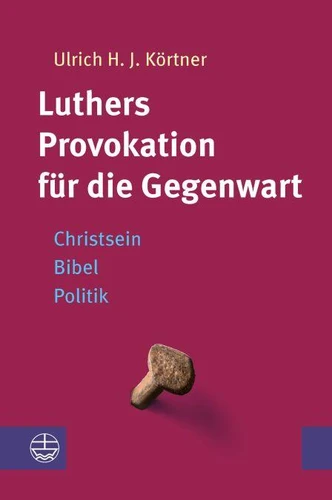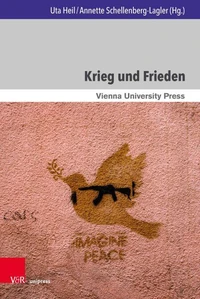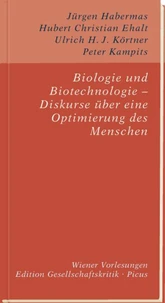Luthers Provokation für die Gegenwart. Christsein – Bibel – Politik
Par :Formats :
Disponible dans votre compte client Decitre ou Furet du Nord dès validation de votre commande. Le format ePub est :
- Compatible avec une lecture sur My Vivlio (smartphone, tablette, ordinateur)
- Compatible avec une lecture sur liseuses Vivlio
- Pour les liseuses autres que Vivlio, vous devez utiliser le logiciel Adobe Digital Edition. Non compatible avec la lecture sur les liseuses Kindle, Remarkable et Sony
 , qui est-ce ?
, qui est-ce ?Notre partenaire de plateforme de lecture numérique où vous retrouverez l'ensemble de vos ebooks gratuitement
Pour en savoir plus sur nos ebooks, consultez notre aide en ligne ici
- Nombre de pages176
- FormatePub
- ISBN978-3-374-05771-9
- EAN9783374057719
- Date de parution01/11/2018
- Protection num.Digital Watermarking
- Taille2 Mo
- Infos supplémentairesepub
- ÉditeurEvangelische Verlagsanstalt
Résumé
Der Bedeutung der reformatorischen Theologie für die Gegenwart
Die Reformation ist mehr als Luther, aber ohne Martin Luther hätte es keine Reformation gegeben. Er war ein radikaler, nach dem biblischen Grund des Glaubens fragender Theologe. Die Sprengkraft seiner Theologie sollte gerade heute neu bewusst gemacht werden. In einer Zeit der religiösen Indifferenz und eines trivialisierten Christentums brauchen wir mehr denn je eine neue Form von radikaler Theologie, die leidenschaftlich nach Gott fragt und auf das Evangelium hört.
Der Gott Martin Luthers ist und bleibt eine Provokation. Die Provokation Luthers steht im Zentrum des Buches von Ulrich H. J. Körtner über Luthers Verständnis christlicher Freiheit, seine Schriftauslegung, seine Auffassungen von Arbeit und Beruf sowie seine Theologie des Politischen. Der renommierte Wiener Systematiker schließt damit theologisch an sein streitbares, 2017 erschienenes Buch "Für die Vernunft.
Wider Moralisierung und Emotionalisierung in Politik und Kirche" an. [Luther's Provocation for the Present Day. Bible - Christian Existence - Politics] The Reformation is more than Luther, but without Luther there would have been no Reformation. He was a radical theologian who inquired after the biblical foundation of the faith. Today in particular, the explosive force of his theology should be brought to awareness.
In a time of religious indifference, and of a trivialized Christendom, we need more than ever a new form of radical theology, that asks passionately after God and heeds the word of the Gospel. Martin Luther's God is and remains a provocation. That provocation is at the center of this book about Luther's understanding of Christian freedom, his interpretation of Scripture, his conception of work and vocation, and his theology of the political.
In this project, the internationally renowned systematic theologian from the University of Vienna follows up his confrontational book from 2017, "Für die Vernunft. Wider Moralisierung und Emotionalisierung in Politik und Kirche".
Der Gott Martin Luthers ist und bleibt eine Provokation. Die Provokation Luthers steht im Zentrum des Buches von Ulrich H. J. Körtner über Luthers Verständnis christlicher Freiheit, seine Schriftauslegung, seine Auffassungen von Arbeit und Beruf sowie seine Theologie des Politischen. Der renommierte Wiener Systematiker schließt damit theologisch an sein streitbares, 2017 erschienenes Buch "Für die Vernunft.
Wider Moralisierung und Emotionalisierung in Politik und Kirche" an. [Luther's Provocation for the Present Day. Bible - Christian Existence - Politics] The Reformation is more than Luther, but without Luther there would have been no Reformation. He was a radical theologian who inquired after the biblical foundation of the faith. Today in particular, the explosive force of his theology should be brought to awareness.
In a time of religious indifference, and of a trivialized Christendom, we need more than ever a new form of radical theology, that asks passionately after God and heeds the word of the Gospel. Martin Luther's God is and remains a provocation. That provocation is at the center of this book about Luther's understanding of Christian freedom, his interpretation of Scripture, his conception of work and vocation, and his theology of the political.
In this project, the internationally renowned systematic theologian from the University of Vienna follows up his confrontational book from 2017, "Für die Vernunft. Wider Moralisierung und Emotionalisierung in Politik und Kirche".
Der Bedeutung der reformatorischen Theologie für die Gegenwart
Die Reformation ist mehr als Luther, aber ohne Martin Luther hätte es keine Reformation gegeben. Er war ein radikaler, nach dem biblischen Grund des Glaubens fragender Theologe. Die Sprengkraft seiner Theologie sollte gerade heute neu bewusst gemacht werden. In einer Zeit der religiösen Indifferenz und eines trivialisierten Christentums brauchen wir mehr denn je eine neue Form von radikaler Theologie, die leidenschaftlich nach Gott fragt und auf das Evangelium hört.
Der Gott Martin Luthers ist und bleibt eine Provokation. Die Provokation Luthers steht im Zentrum des Buches von Ulrich H. J. Körtner über Luthers Verständnis christlicher Freiheit, seine Schriftauslegung, seine Auffassungen von Arbeit und Beruf sowie seine Theologie des Politischen. Der renommierte Wiener Systematiker schließt damit theologisch an sein streitbares, 2017 erschienenes Buch "Für die Vernunft.
Wider Moralisierung und Emotionalisierung in Politik und Kirche" an. [Luther's Provocation for the Present Day. Bible - Christian Existence - Politics] The Reformation is more than Luther, but without Luther there would have been no Reformation. He was a radical theologian who inquired after the biblical foundation of the faith. Today in particular, the explosive force of his theology should be brought to awareness.
In a time of religious indifference, and of a trivialized Christendom, we need more than ever a new form of radical theology, that asks passionately after God and heeds the word of the Gospel. Martin Luther's God is and remains a provocation. That provocation is at the center of this book about Luther's understanding of Christian freedom, his interpretation of Scripture, his conception of work and vocation, and his theology of the political.
In this project, the internationally renowned systematic theologian from the University of Vienna follows up his confrontational book from 2017, "Für die Vernunft. Wider Moralisierung und Emotionalisierung in Politik und Kirche".
Der Gott Martin Luthers ist und bleibt eine Provokation. Die Provokation Luthers steht im Zentrum des Buches von Ulrich H. J. Körtner über Luthers Verständnis christlicher Freiheit, seine Schriftauslegung, seine Auffassungen von Arbeit und Beruf sowie seine Theologie des Politischen. Der renommierte Wiener Systematiker schließt damit theologisch an sein streitbares, 2017 erschienenes Buch "Für die Vernunft.
Wider Moralisierung und Emotionalisierung in Politik und Kirche" an. [Luther's Provocation for the Present Day. Bible - Christian Existence - Politics] The Reformation is more than Luther, but without Luther there would have been no Reformation. He was a radical theologian who inquired after the biblical foundation of the faith. Today in particular, the explosive force of his theology should be brought to awareness.
In a time of religious indifference, and of a trivialized Christendom, we need more than ever a new form of radical theology, that asks passionately after God and heeds the word of the Gospel. Martin Luther's God is and remains a provocation. That provocation is at the center of this book about Luther's understanding of Christian freedom, his interpretation of Scripture, his conception of work and vocation, and his theology of the political.
In this project, the internationally renowned systematic theologian from the University of Vienna follows up his confrontational book from 2017, "Für die Vernunft. Wider Moralisierung und Emotionalisierung in Politik und Kirche".











